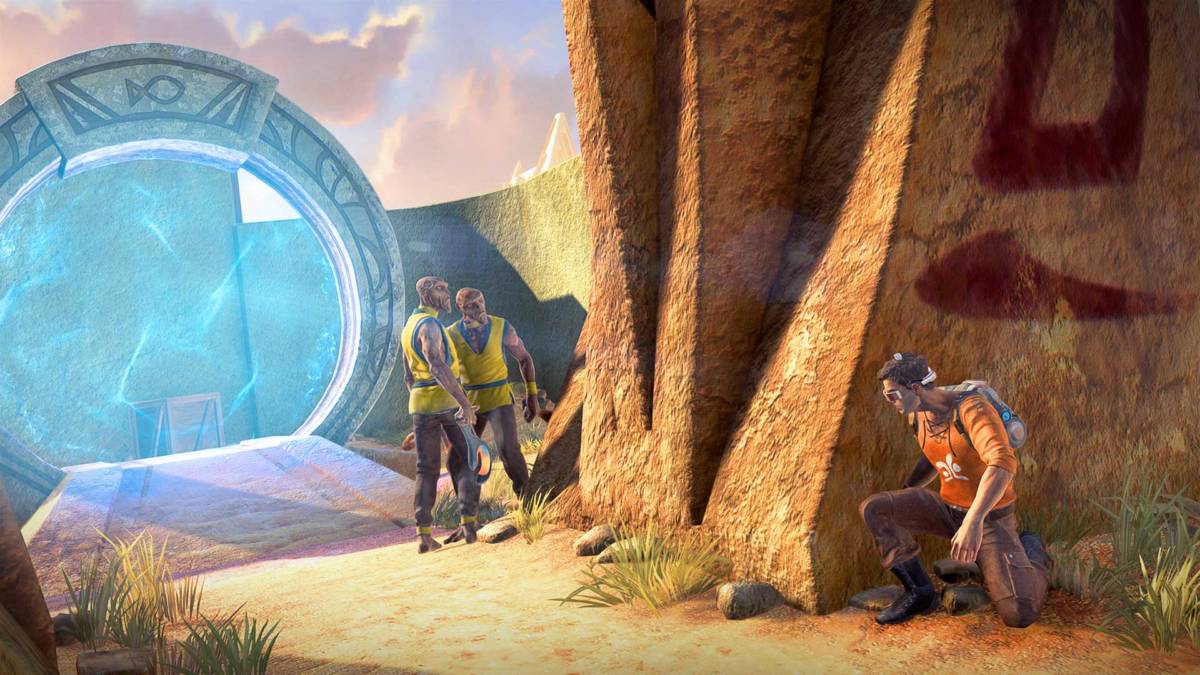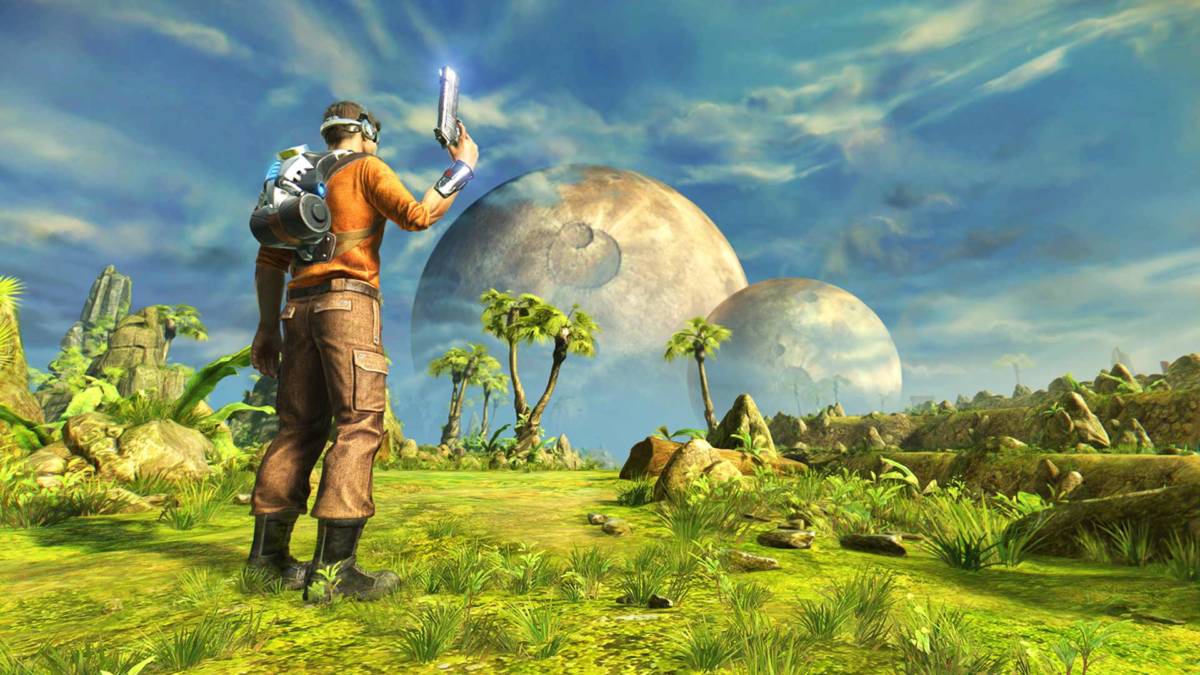The year is 1999. WWE is still called WWF (and still good), nu-metal is everywhere, and one of the biggest landmarks in gaming quietly arrives on PC. Developers Appeal might not have known it at the time, but their sci-fi RPG would go on to become one of the most important games of all-time with the devout cult following to match.
The year is 1999. I am nine years old and pretending to get drunk off of Coca-Cola at a bar. I don’t know what Outcast is. I also like Limp Bizkit.
The fact that I had no prior knowledge of Outcast before a code landed in my inbox over the weekend is no doubt going to rankle some people. It was simply before my time, which oddly enough is also what a lot of people describe Outcast as. It possessed a lot of the modern hallmarks of what we now view as standard for our open-world games, but never had the mainstream appeal to match its ambition. Think of a 3D open-world game and it will probably owe some inspiration to Outcast, being that it was lauded as the first of its kind.

Following a sequel that never was and a Kickstarter campaign that didn’t quite get off the ground, the once dormant developers of Outcast, Appeal, reconvened and decided to power through with the development of Outcast – Second Contact: a remake of the original game with a modern lick of paint. Rather than being a from-the-ground-up remake that completely reinvents the game, Second Contact is a visual upgrade that tries to bring Outcast closer to the current generation, though it truthfully wouldn’t look out of place in the last.
You play as Cutter Slade, an elite soldier who finds himself in an alien world called Adelpha amongst its inhabitants, the Talan. He becomes embroiled in civil war and religious strife, as well as trying to track down the lost teammates who accompanied him to this bizarre new land.
Outcast – Second Contact doesn’t hold the hand of the player for even a second. Aside from a few quick tutorial missions, it’s ultimately up to you to discover the game’s mechanics and quirks all on your own. You are dropped in the region of Shamazaar and told to get on with the task at hand, and all the neat little side tasks that crop up which are connected with each other. Second Contact offers complete freedom, which might be welcome to some, but it doesn’t always feel intuitive or simple to grasp. You will need about ten hours with it before you feel even slightly clued in, and even then it isn’t always a smooth ride.

This is, in a way, to the credit of the team at Appeal. Rather than bending to contemporary conventions, they’ve stuck to their -rather obtuse- guns by refusing to include markers to point the player in the right direction, or even simple signage. A great portion of my time was spent ambling around and trying to distinguish one green bit of land from the next bit of green land, which was a running theme throughout the rest of the areas I had a sojourn into.
Something as simple as following a quest feels far more like work than it needs to be. Traversing areas requires plenty of attention to detail, whether they’re in the often less than helpful instructions in the notepad or non-committal directions given by the locals. Second Contact is also a game that you’re going to need to play in as long sessions as you can because I took a short break from the game, came back to it, and had absolutely no idea where I was or what I was supposed to be doing. You may find the going a lot easier with an actual notepad.
The developers wanting to promote exploration is fine, especially as they’ve clearly put plenty of care into creating an impressive collection of different environments. However, it becomes a bit of an issue when it just simply doesn’t feel great to travel around. Cutter controls like a refrigerator with a bunch of hibernating bears inside of it, which makes the already lethargic combat feel extra cumbersome. Gunplay just about works, auto-targeting on enemies after a while, but it certainly feels like it belongs in Outcast’s original time.

Despite it sounding like a bit of a disaster so far, Outcast – Second Contact certainly has some great things going for it. First off, that magnificent soundtrack: a skin-tingling blend of orchestral music that wouldn’t seem out of place in John Williams’ impressive discography. The superb soundtrack also matches the game’s vibrant personality with plenty of silly jokes and a lot of attention paid to creating a living lore that sucks you in, as bizarre as it may be.
Outcast’s biggest saving grace, however, has to come in the way it approaches the reactivity of NPCs to your actions, a mechanic that modern fare seems to have dropped some time ago. There’s no karma system as such, but the people of Adelpha will either embrace or shun you based on your reputation and how they perceive you as their saviour. For instance, I accidentally killed a friendly Talan because they wouldn’t get out of the way of an explosion area, which meant that I would regularly be harangued by the locals whenever I passed them – I was even cut off from the smith who crafted ammo for me.

However, even its brightest spots weren’t enough to keep me coming back – I walked away from Second Contact shortly after collecting my first Mon. When I reached new lands, I had hoped that it would become less opaque and approachable. Instead, it was just more of the same frustrating wandering and hoping that I would stumble across something interesting. I enjoyed some promising glimpses, such as when I tried to recite a song with a beggar (and failed), but these moments were too few and far between to help me look past the many, many grievances I had with the game’s archaic ways.
But I really don’t think Outcast – Second Contact was made for me, a jaded reviewer who only really delved into gaming when the PS2 came around. It was made for the original game’s devotees, those who would shout about this plucky game whenever they could to get the word out, or carry on the calls for a sequel when hope was fading. If you have fond memories of Outcast, Second Contact should make them come rushing back. It’s the game you loved when few others would, except with a slightly shinier sheen. If that’s all you wanted from the remake, Second Contact is a success.
A PS4 code of Second Contact was provided for coverage purposes.
Some of the coverage you find on Cultured Vultures contains affiliate links, which provide us with small commissions based on purchases made from visiting our site.

